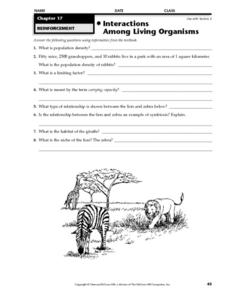Shodor Education Foundation
Incline
Study velocity while examining graphical representations. As scholars work with the animation, they discover the effect the height of an incline has on the velocity of the biker. They make conclusions about the slope of the...
American Museum of Natural History
Around the World with DNA
DNA analysis could be what saves some animals from extinction. An interactive lesson shows learners how DNA information proves variation among animals of the same species and how stakeholders use that information to make decisions. Easy...
Cold Spring Harbor Laboratory
DNA Words Are Three Letters Long
DNA writes 64 different words but only codes for 20 different amino acids. Budding scientists learn about where each of these numbers come from and why they aren't equal with an online interactive. The resource explains the research, the...
Cold Spring Harbor Laboratory
RNA Is an Intermediary Between DNA and Protein
For years, scientists believed tRNA was junk left over from larger RNA. Three scientists used different approaches to prove tRNA actually exists as the connection between DNA and protein. Learn about their experiments, their lives, and...
Scholastic
Study Jams! Air Masses & Fronts
Four types of air masses interact in the atmosphere above the US. The collision of these air masses forms a front, which, in turn, creates our weather. Concepts are explained by Sam and RJ, thus preventing a snowball fight. Your class...
Concord Consortium
Intermolecular Attractions and Boiling Point
Why do different substances have different boiling points? Through an interactive lesson, learners explore how intermolecular attractions affect boiling points. They interact with molecules through an animation and make conclusions about...
Learning Games Lab
Scientific Graph Reading
Interpreting graphs is an essential skill for young scientists. An interactive online lesson gives individuals an opportunity to review the components of a graph and learn to read and interpret the shape of a graph. The lesson includes...
Curated OER
Teeth and Eating
Students conduct online research of different animals and their diet. In this animal lesson, students identify the various types of diets each animals has and their teeth. This research is done on the Internet.
Curated OER
Tic Tac Know Kingdoms
In this PowerPoint, students participate in a variation of tic tac toe in which questions about the animal and plant kingdom are presented and students move to various locations on the game board.
Curated OER
Sheltering and Caring for Animals
Students learn about animal shelters and adoption agencies. In this animal care lesson plan, students watch a video about the ASPCA and discuss what an animal shelter is, how it operates and what services it provides animals and the...
Paul Hudson
SPQR Latin Dictionary and Reader
Searching for an incredibly thorough Latin app? Look no further! Latin learners will be quite satisfied with the collection of texts, three dictionaries, customizable flashcards, assessment options, and other features that are right at...
Curated OER
Ocean World - Interactive On-line Quiz - Coral Reefs
In this coral worksheet, students answer 9 multiple choice questions about coral and coral reefs using an interactive on-line format.
Curated OER
Interactions Among Living Organisms
In this animal population worksheet, learners will complete 8 short answer questions based on population density, including limiting factors and carrying capacity.
Curated OER
Animal Habitats and Their Management
Students review components present for a quality animal habitat and then explore a goose pond to find out what animals reside there. They learn how wildlife managers work with the land so everything can co-exist together.
Curated OER
Pets and People
Students discuss the pros and cons of having household pets. In this health lesson, students identify different types of diseases they can get from pets. They evaluate their pet interactions and suggest ways to modify health habits after...
Curated OER
Where are all the Animals?
Students view animals that camouflage at the Shedd aquarium website. In this camouflage lesson, students recognize that there are different types of camouflage, cryptic coloring, counter-shading, warning coloration and mimicry. Students...
Curated OER
Paws, Claws, Hands, and Feet
In this animal hands and feet worksheet, students complete 4 pages of exercises that pertain to claws, paws, hands and feet. Students read clues and match them to the animals. Students analyze pictures of animal parts and match them to...
Curated OER
Animals and Humans Say the Darnedest Things
Learners explore and analyze human and animal communications and create a short film that illustrates their findings.
Curated OER
The Pearl by John Steinbeck
In this literature worksheet, students respond to 10 short answer and essay questions about The Pearl. Students may also link to an online interactive quiz on the novel at the bottom of the page.
Curated OER
The Chesapeake Bay in Captain John Smith's Time
When Captain John Smith visited the Chesapeake Bay in the summer of 1608, what types of animals and habitats did he encounter? Your young historians will analyze primary source documents to answer this question, as well as compare...
Scholastic
Study Jams: Symbiosis
Three types of symbiosis are explained: parasitism, commensalism, and mutualism. This is done with colorful animation and lively dialogue in a straightforward and easy-to-follow manner. Have your ecology class watch this at home and then...
Science Friday
Fossil Detectives
What can this rock be? Pupils pretend to be paleontologists by sketching fossils and making predictions about their types. To determine whether they can identify the type of dinosaur, class members compare their observations and...
ReadWriteThink
Defining Literacy in a Digital World
What skills are necessary to interact with different types of text? Twenty-first century learners live in a digital world and must develop a whole new set of skills to develop media literacy. Class members engage in a series of...
The New York Times
Collateral Damage? Researching a Connection Between Video Games and Violence
Hook your class into an exploration of and discussion about violence in video games with a cute animal clip and a video game trailer. After a quick discussion about how media can affect mood, class members read a related article and...






















